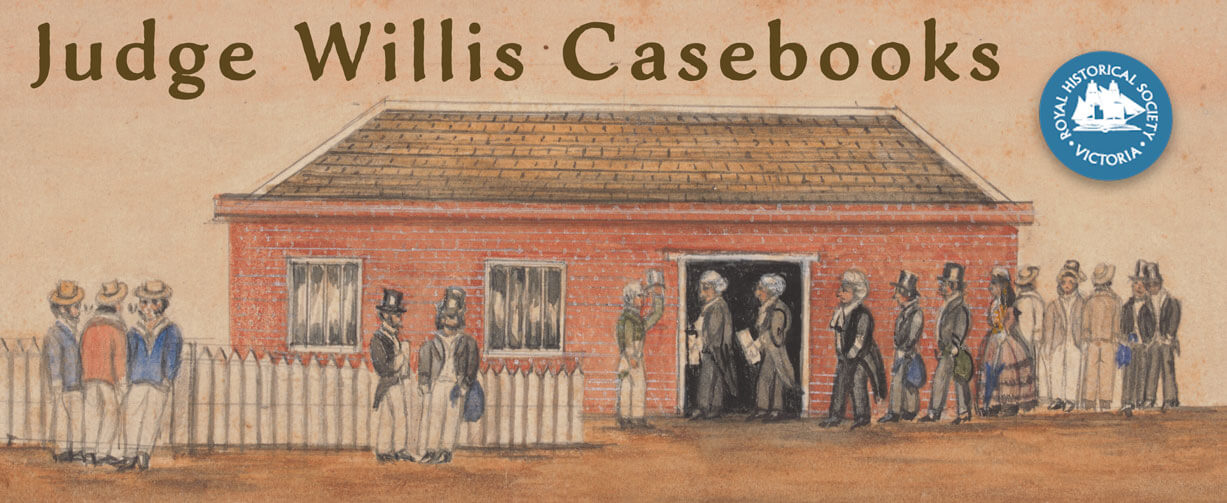
John Walpole Willis – A Biographical Sketch
His Honour Paul R Mullaly QC
England
Canada
Willis’ differences with the senior officials in Upper Canada became clear and very public when he was the trial Judge in the case of Francis Collins, a newspaper proprietor. The Attorney-General had brought a criminal libel against Collins in relation to matter he had published about the separate activities of the Lieutenant-Governor and the Solicitor-General. When Collins was arraigned he asked permission to address the Court. Willis gave permission and Collins launched an attack on the Attorney-General alleging partiality and Willis allowed him to continue even after the Attorney-General appeared in Court and objected. Willis adjourned the trial to allow Collins to take criminal proceedings against the Attorney-General. Eventually, the Crown dropped the proceedings against Collins who agreed not to prosecute the Attorney-General.
Willis also had problems with his fellow Judges as to the interpretation of the law and because of the hostile way he expressed his dissent. A further problem arose when the Chief Justice of the Court, Campbell, went on leave, prior to retirement. Willis applied to become Chief Justice and took the view that the relevant legislation required that the Court must always consist of three active Judges. He refused to sit with the other available Judge. Willis sent a memorandum about this matter to the Colonial Secretary in London and conveyed his opinion to the Lieutenant-Governor. The other Judge, Sherwood, disagreed with Willis and, ultimately, the decision was made that Willis should be amoved from judicial office. The formal Writ to this effect was issued on 26 June 1828.
Willis took the view that this amoval was illegal and returned to England, in July 1828, to take the necessary action. He appealed to the Privy Council which, in 1830, decided that the Lieutenant-Governor was wrong in amoving him without giving him the opportunity to be heard, but that Willis’ opinion about the court was wrong, albeit that he had acted with high motives and in accord with what he considered to be his duty.
Divorce
British Guiana
On 13 September 1836, Willis married Ann Susannah Kent, a widow, and they prepared to return to British Guiana. However, the Governor of British Guiana had made representations to the Colonial Office that Willis should not return to British Guiana. The basis for this request was that the other Judges had difficulties dealing with Willis and he had become involved, controversially, in public affairs.
New South Wales
In July 1838, Willis publicly denounced “the undue assumption of spiritual power, the adoption of unauthorised traditions and idolatrous worship” of the Church of Rome. Such comments were not uncommon at this time. The Catholic Archbishop of Sydney, Polding, presided over a public meeting which demanded that Willis be removed from the bench on the basis that no Catholic could feel secure in impartial justice. Polding also moved in London to have Willis removed.
Port Phillip
Willis was very formal in the conduct of his Court. The formalities at the commencement of each Criminal Sessions included the reading of the Royal Proclamation for the Suppression of Vice. He addressed some jury panels before any trials commenced; one such address instructed the jurors not to be prejudiced against some Aborigines who were to be tried for murder in that Sitting. So too, he took the opportunity to address public affairs in End of Term speeches. In 1842, two of those speeches dealt with the then financial crisis.
He insisted, pursuant to a UK Statute, that the committing Magistrates attend the Criminal Sessions. James Simpson was the Police Magistrate in Melbourne and Willis, constantly, queried Simpson’s qualifications to hold that office and was very critical of him when he was absent from a Criminal Sessions. When Willis was told, by James Croke, the Crown Prosecutor, that Simpson’s absence was due to unavoidable delay at a Bank he was so critical of Simpson when he arrived in Court that Simpson resigned from his Office.
Willis was also insistent that members of the legal profession adhere, strictly, to the rules and conventions relative to their professional activities. He reprimanded the barrister, Archibald Cunninghame, when he mistakenly thought that Cunninghame was also running a horse breeding business; the breeder was Cunninghame’s brother.
When it emerged, incidentally, in some civil litigation that James Croke, the Crown Prosecutor, had been in some transaction with William Lonsdale which involved Croke giving Lonsdale a Bill of Exchange, Willis was very critical of Croke for using a Bill of Exchange. There was no suggestion that there were any problems about the Bill or the transaction and Croke, who happened to be in Court, took exception to Willis’ comments. When Willis adhered to his comments, Croke and the other Barristers in the Court walked out and the Court had to be adjourned. In early 1843 when it emerged in some proceedings that some Bills of Exchange issued by the Honourable James Erskine Murray, a Barrister, had been dishonoured, Willis immediately struck Murray off the Roll. Murray was not then within the Jurisdiction and died a short time later.
If it emerged in some matter before the Court that some Solicitor had acted, improperly in some legal activity, Willis either suspended the Solicitor for a brief period or limited the type of legal work that solicitor could do. Willis had a continuing conflict with a Solicitor named Horatio Nelson Carrington. This conflict had commenced in Sydney. Carrington was involved in some of the cases which caused public concern about Willis’ judicial work.
Willis’ conduct in Court attracted critical comment in both The Port Phillip Gazette and The Port Phillip Herald. Willis took objection to the manner in which the Herald reported his comments about Simpson and legal proceedings to attach the Editor, George Cavenagh, were commenced but Willis did not persist on that occasion. Later, Willis threatened to gaol Cavenagh when he was reluctant to produce a deed which Willis considered to be relevant to some civil proceedings.
In September 1841, the Gazette published a letter signed by “Scrutator” which was very critical of Willis’ conduct in Court and suggested he be removed. James Croke moved that George Arden, the proprietor of the Gazette, be attached for Contempt of Court. After various lengthy proceedings which lasted until February 1842, Willis sentenced Arden to 12 months imprisonment and fined him £300. This sentence was remitted in April 1842.
Such was the public interest in Willis’ conduct that, in 1842, there was a public petition that he should be removed and another that he be retained. The petition in support of Willis was organized by John Pascoe Fawkner. There were suggestions that Willis was providing financial support for Fawkner’s paper, The Patriot.
Despite all the public interest in Willis, he continued his judicial work. During his time in Melbourne there were more than 200 criminal matters before the Court. The surviving material indicates that he usually applied the then criminal law correctly, sometimes after much research. The one case in which he took a view of the law, contrary to that of other judges, was in the trial of the Aborigine, Bonjon, in September 1841. Willis took the view that the Court had no jurisdiction to try an Aborigine for killing another Aborigine.
Late in 1842, Willis applied for sick leave but was refused on the grounds of the cost involved. In May 1843 a public meeting was held in Melbourne at which complaints were made about Willis’ conduct and fears expressed by citizens of their ability to appear in his Court. In proceedings about John Batman’s will, Willis suggested that William Lonsdale be charged with a criminal offence. In another proceeding, Willis imprisoned J B Were for alleged prevarication.
Amoval
John Plunkett, the NSW Attorney-General was overseas when Willis was amoved but, on his return, he read the papers and told Governor Gipps that the failure to hear Willis, before his amoval, would be a concern.
Willis took action in the Privy Council but it was not until 1846 that the Privy Council decided that, although there were grounds for Willis’ amoval, it was illegal as he had not been given the opportunity to be heard before being amoved. The solution reached was that Willis would be paid arrears of salary and that he would resign.
Willis remained in England and died on 10 September 1877.
He must have left some of his Court note books in Melbourne but where or in whose custody in not known. The Willis materials now in the possession of the RHSV were mainly received from James Palmer Savage, a Solicitor, on 1 July 1909. One of the criminal note books was found by Savage’s daughter, in the family home, in 1931, and then given to the Society.
In 2014, The Judge Willis Casebooks website was developed with support from the Wilson Trust & His Honour Paul R Mullaly QC. The website was created by Jason Odering. In 2018, the RHSV website was rebuilt and the Judge Willis Casebooks have been reconstructed with respect to the original layout and design. Judge Willis Casebooks: Terms of Use

 239 A'Beckett Street Melbourne, Victoria, 3000
239 A'Beckett Street Melbourne, Victoria, 3000  03 9326 9288
03 9326 9288  office@historyvictoria.org.au
office@historyvictoria.org.au  Office & Library: Weekdays 9am-5pm
Office & Library: Weekdays 9am-5pm

